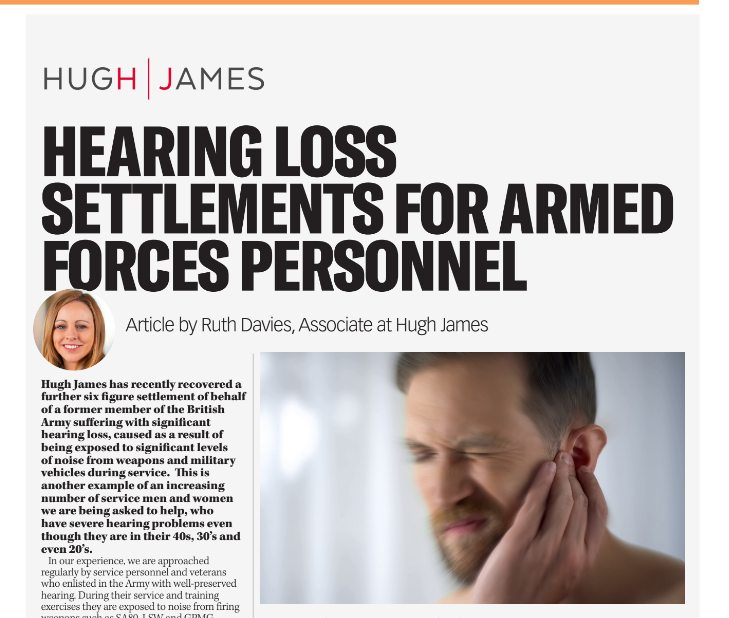Hugh James has recently recovered a further six figure settlement of behalf of a former member of the British Army suffering with significant hearing loss, caused as a result of being exposed to significant levels of noise from weapons and military vehicles during service.

This is another example of an increasing number of service men and women we are being asked to help, who have severe hearing problems even though they are in their forties, thirties and even twenties.
In our experience, we are approached regularly by service personnel and veterans who enlisted in the Army with well-preserved hearing. During their service and training exercises they are exposed to noise from firing weapons such as SA80, LSW and GPMG.
Clients tell us that they are provided with ear defenders which they allege to be inadequate and unsuitable to use when on ranges and exercises.
We are often told that following exercises or training, our clients undergo medicals, resulting in their hearing being investigated. In some instances, whilst being investigated, our clients tell us that they continue to be exposed to noise from weaponry.
Whilst many of our clients describe impressive achievements in service, sadly, others often tell us that their hearing loss impacts their ability to serve or results in their service being terminated due to their hearing loss triggering a medical discharge.
We too often are told by our clients that despite being aware of their noise induced hearing loss, they are still sent on firing ranges, training exercises and deployment that expose them to excessive noise which continues to damage their hearing and tinnitus.
Whilst our clients are regularly downgraded or discharged from service due to their hearing loss, it is not uncommon for us to be told that our clients submit unsuccessful claims through the Armed Forces Compensation Scheme (AFCS) or War Pension Scheme (WPS) because their hearing disability is assessed as not sufficient to meet the criteria to qualify for compensation.
Our military injury team are frequently contacted to see if we can help serving personnel and veterans. If we agree take a case on, the claim is allocated to a member of our team who specialises in Military Claims against the MoD.
We consider each aspect of the claim to include whether there is a potential loss of earnings and/or pension. In a recently settled six figure claim, we obtained a report from an employment expert where it was later agreed by the parties that, had the claimant not been medically discharged due to his hearing loss, he would have been likely to complete 24 years’ service with promotion to Warrant Officer 2.
Upon completing 24 years’ service the claimant contended that he would likely have found work as an Operations Manager and joined the Volunteer reserves. As a result, we successfully secured settlement to include a Loss of Earnings and Pension due to his injury.
Following settlement in successful claims, our clients regularly tell us that their settlement will provide some financial security and compensate them for the effect their hearing damage will have on their life and in some cases, future earnings.
Our clients are not alone having to deal with significant levels of hearing loss that could have been avoided, had the MoD taken proper steps to give them the right protective equipment and training. Any service personnel or veterans facing similar issues should seek advice on their legal rights as soon as possible.
If you have hearing problems that developed during your military service and would like advice on your legal options, please get in touch with Hugh James and we will be pleased to discuss this with you on
08085 008 002.
This article has been adapted from a previous blog post called “Six figure settlement recovered for veteran’s hearing loss claim” which was published on the Hugh James website on 4 January 2023 and this article adaptation appears in Hugh James’ monthly column within Pathfinder International magazine.
Article written by Ruth Davies, Associate at Hugh James.
